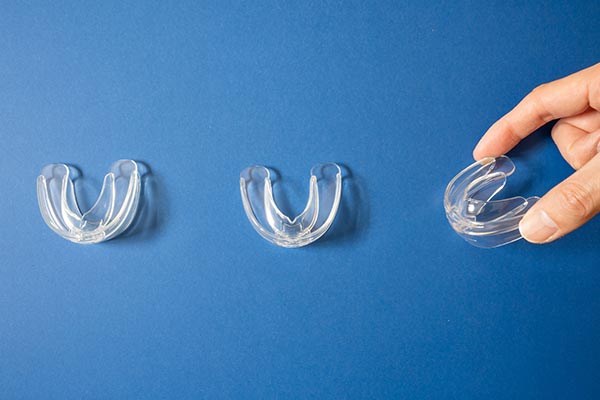Over-the-counter mouthguards versus custom mouthguards
Mouthguards are available without a prescription or a dentist’s appointment, but these generic models will likely not fit the patient's mouth perfectly. Dental appliances that are not custom-made may cause chafing, mouth sores, and an overall feeling of discomfort for the patient. Over-the-counter guards may suffice as a temporary protective appliance for the teeth, but patients who suffer from moderate to severe bruxism or who need a more comfortable guard for long hours of sports practice can benefit from talking to a general dentist about being fitted for a quality mouthguard that will last for years.
Types of mouthguards general dentists can prescribe
While mouthguards can be crafted to fit over a patient’s top or bottom teeth, the style, thickness, and material is decided upon by the general dentist. The dentist collaborates with the patient to decide which type of guard is the most appropriate.
Mouthguards for those with medical concerns
Patients who suffer from tooth grinding, or bruxism, may contend with frequent headaches as well as jaw soreness and stiffness. While bruxism patients may think that these uncomfortable and often painful symptoms are a fact of life, many are not aware that teeth grinding can lead to more severe concerns like temporomandibular joint pain and cracked teeth. Grinding is unlikely to permanently damage teeth in the short term, but if the friction continues over weeks or years, tooth enamel and even the teeth themselves can be worn down.
Patients who are at higher risk for damaging teeth as a result of bruxism may be prescribed a thicker guard than those who have a milder form of the condition. These mouthguards can be worn at any time of day, but they are most often worn at nighttime when grinding cannot be consciously controlled.
Mouthguards for athletes
Individuals who play sports with a high risk of injury, such as football, hockey, basketball, and boxing, can benefit from wearing a mouthguard. This type of guard is designed to protect the tongue, inner cheeks, lips, and gums as well as the teeth during intense periods of physical activity. Sports mouthguards are generally bigger than nightguards as they are designed to safeguard against dental trauma. Younger athletes may be interested to know that sports mouthguards often come in a range of colors.
Conclusion
Dental appliances have a reputation for being bulky and irritating to wear; however, custom guards can be sculpted to provide maximum comfort for the patient. Consult with a general dentist to ascertain whether a mouthguard is the right choice for your lifestyle and dental needs.
Request an appointment or call Lee Family and Cosmetic Dentistry at 662-546-1143 for an appointment in our Oxford office.
Related Posts
You can see your general dentist if you want to renew your smile. There are specific treatments that can improve your teeth and gums. At the same time, your dental functions can be better as well. Here are the cosmetic dental services that your general dentist can provide.Crooked teeth can distort one’s smile. This problem…
Talking to your general dentist about your dental anxiety can help start your dental appointment the right way. This condition can prevent you from getting the right dental treatments. Keeping it at bay is possible during the visit. Here are the details on how your general dentist can help relieve your dental anxiety.This is an…
General dentists' primary aim is to ensure optimal oral health, meaning the entire mouth. Therefore, they recommend various services to ensure the longevity of your natural teeth and surrounding structures. Take a look at the five preventative services we offer.Routine evaluations are recommended for all individuals, regardless of age. The American Dental Association, or ADA,…


